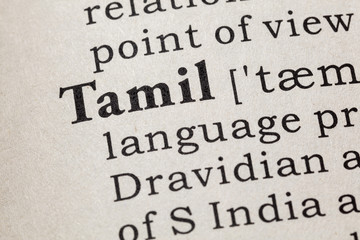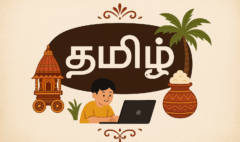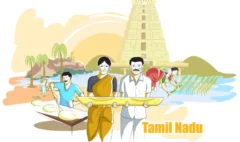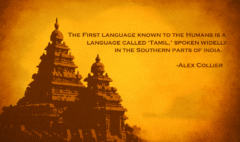The Role of Tamil in the Indian Judicial System
The Role of Tamil in the Indian Judicial System
The Role of Tamil in the Indian Judicial System: The Language of Law and Justice
The judicial system is one of the foundational pillars of a democratic society. It is the institution through which our laws are interpreted, our rights are protected, and justice is administered. The language of the law is a very specific and powerful one, a formal register that is designed for precision, clarity, and authority. In India, with its rich tapestry of languages, the role of regional languages within the judicial system is a topic of great importance and ongoing debate. In the state of Tamil Nadu, the Tamil language plays a vital and deeply significant role in the daily functioning of the judiciary. An understanding of the world of Tamil law (சட்டம் – Caṭṭam) and the key legal terms in Tamil is essential for any law student, legal professional, or citizen who wishes to have a more complete understanding of the state’s governance.
This guide will provide a comprehensive introduction to the role of Tamil in the judicial system Tamil Nadu. We will explore the extent to which the language is used in the courts and will provide a glossary of the most essential court vocabulary in Tamil. This is a journey into a more formal and sophisticated realm of the language, the language that defines our rights, our duties, and our collective pursuit of justice.
The Language of the Courts: A Tale of Two Tiers
The use of Tamil in the courts of Tamil Nadu is best understood by looking at the different levels of the judicial hierarchy.
The High Court and the Supreme Court: The Prevalence of English
The official language of the Supreme Court of India and of the Madras High Court (சென்னை உயர் நீதிமன்றம் – Ceṉṉai uyar nītimaṉṟam) is, by law and tradition, English. All of the formal proceedings, the arguments made by the senior advocates, and, most importantly, the final written judgments are conducted and recorded in English.
- The Rationale: The rationale for this is based on the need for a uniform language that can be understood by judges and lawyers from all over India, as judges of the High Court can be transferred from any state. It also ensures that the judgments of the High Court, which form a part of the nation’s legal precedent, are accessible to the entire Indian legal community.
– The Movement for Tamil in the High Court: It is important to note that there has been a long-standing and passionate political and social movement in Tamil Nadu advocating for Tamil to be recognized as an official language of the Madras High Court. This movement is rooted in the belief that for justice to be truly accessible, it should be conducted in the language of the people. This remains a significant and ongoing topic of legal and political debate.
The Subordinate Courts: Where Tamil Takes Center Stage
The story is very different in the vast network of subordinate courts throughout the state. In the District Courts, the Magistrate Courts, and other lower courts, the Tamil language plays a central and dominant role.
- The Language of Daily Proceedings: In these courts, which handle the vast majority of civil and criminal cases that affect the everyday lives of the people, Tamil is the primary language of the courtroom.
– Petitions and Filings: Litigants have the right to file their petitions, their affidavits, and all other legal documents in Tamil.
– Arguments and Testimonies: Lawyers can, and very often do, argue their entire case in Tamil. Witnesses give their testimony in Tamil, ensuring that they can express themselves clearly and without the barrier of a foreign language.
– Judgments: The final judgments of these subordinate courts are also frequently written and delivered in Tamil.
This makes a strong, functional knowledge of these legal terms in Tamil an absolutely essential skill for any lawyer who wishes to practice effectively in the state of Tamil Nadu.
An Essential Glossary of Court Vocabulary in Tamil
This core vocabulary is the key to understanding the language of the judicial system.
The System and the Players:
- Court – நீதிமன்றம் (Nītimaṉṟam)
– Judge – நீதிபதி (Nītipati)
– Lawyer / Advocate – வழக்கறிஞர் (Vaḻakkaṟiñar)
– Plaintiff / Complainant – வாதி (Vāti)
– Defendant – பிரதிவாதி (Pirativāti)
– Witness – சாட்சி (Cāṭci)
Fundamental Legal Concepts:
- Law – சட்டம் (Caṭṭam)
– Justice – நீதி (Nīti)
– Right(s) – உரிமை (Urimai)
– Constitution – அரசியலமைப்பு (Araciyalamaippu)
– Civil Law – உரிமையியல் சட்டம் (Urimaiyiyal caṭṭam)
– Criminal Law – குற்றவியல் சட்டம் (Kuṟṟaviyal caṭṭam)
– Crime – குற்றம் (Kuṟṟam)
– Theft – திருட்டு (Tiruṭṭu)
– Murder – கொலை (Kolai)
The Legal Process:
- Case / Lawsuit – வழக்கு (Vaḻakku)
– Complaint / Petition – புகார் (Pukār) / மனு (Maṉu)
– Police – காவல்துறை (Kāvalturai)
– First Information Report (FIR) – முதல் தகவல் அறிக்கை (Mutal takaval aṟikkai)
– Investigation / Inquiry – விசாரணை (Vicāraṇai)
– Summons – சம்மன் (Cammaṉ)
– Arrest – கைது (Kaitu)
– Bail – ஜாமீன் (Jāmīṉ)
– Evidence – ஆதாரம் (Ātāram)
– Proof – சான்று (Cāṉṟu)
– Argument – வாதம் (Vātam)
– Cross-examination – குறுக்கு விசாரணை (Kuṟukku vicāraṇai)
– Judgment / Verdict – தீர்ப்பு (Tīrppu)
– Acquittal – விடுதலை (Viṭutalai)
– Conviction – தண்டனைத் தீர்ப்பு (Taṇṭaṉait tīrppu)
– Punishment / Sentence – தண்டனை (Taṇṭaṉai)
– Fine – அபராதம் (Aparātam)
– Imprisonment – சிறைத்தண்டனை (Ciṟaittaṇṭaṉai)
– Appeal – மேல்முறையீடு (Mēlmuṟaiyīṭu)
Conclusion: A Language of Access to Justice
The role of the Tamil language in the judicial system Tamil Nadu is a powerful and evolving one. While the higher judiciary continues its dialogue in English, the subordinate courts of the state are vibrant spaces where justice is sought, argued, and delivered in the mother tongue of the people. This use of Tamil in the lower courts is a crucial aspect of ensuring access to justice for all citizens, regardless of their proficiency in English. For the student of Tamil law, a mastery of this formal and precise court vocabulary in Tamil is not just an academic requirement; it is a necessary tool for navigating the very real and complex world of the Indian legal system.








